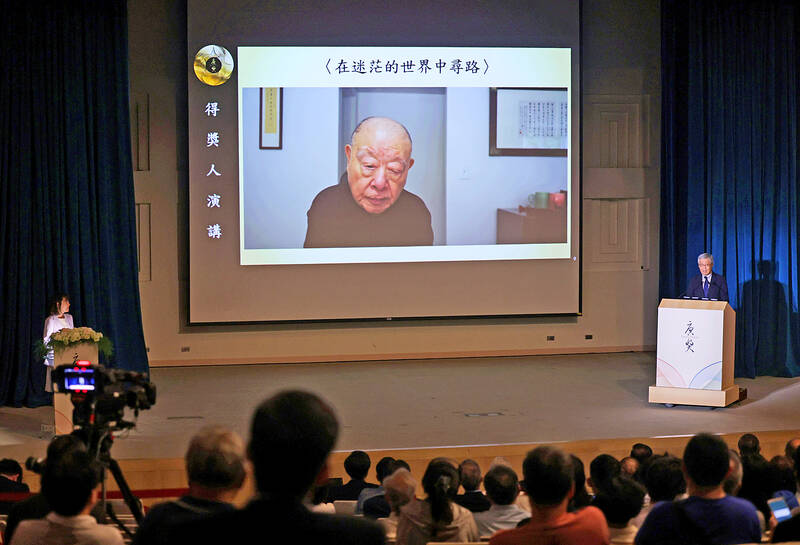Taiwanese-American historian Hsu Cho-yun (許倬雲) yesterday said his work regarding the ancient Chinese myth of Da Yu (大禹) was an example of integrating social science methodologies into historical research that helped him win this year’s Tang Prize in Sinology.
The 94-year-old academic said during a prerecorded video at the Tang Prize Masters’ Forum that his research into the 4,200-year-old myth of Da Yu, also known as Yu the Great or the Tamer of the Flood, showed that there was indeed major flooding at that time, indicating the legend could be rooted in reality.
Da Yu, a Xia Dynasty ruler, was widely popular for implementing flood controls and ending decades-long floods that devastated his people.

Photo: CNA
Hsu said he visited many areas mentioned in the legend and that his research showed it was grounded in historical and geographical reality.
He also cited scientific evidence that suggested glacial lakes flooded the Tibetan Plateau, along with the headwaters of the Yellow and Yangtze rivers, and that there were decades-long torrential rains in the area where Da Yu lived.
Hsu, who specializes in ancient Chinese history, won the prize for his “holistic approach to the study of Chinese history; his engagement with the cultural and intellectual exchanges between China and the world; and his capacity to broach contemporary issues from the perspective of antiquity,” the Tang Prize Foundation said in a news release.
Born in 1930 in Xiamen, China, Hsu and his family moved to Taiwan in 1948, one year before the end of the Chinese Civil War.
He received his master’s and bachelor’s degrees from National Taiwan University (NTU) before earning a doctorate from the University of Chicago.
Hsu held academic positions at Academia Sinica from 1956 to 1971, before moving to the US to teach at the University of Pittsburgh in 1970.
After graduating, he taught at NTU for a few years and then as a professor of history and sociology at the University of Pittsburgh for 30 years.
The Tang Prize in Sinology recognizes the study of sinology, awarding research on China and related fields, such as Chinese thought, history, philology, linguistics, archeology, philosophy, religion, traditional canons, literature and art.
A NT$40 million (US$1.26 million) cash prize and an additional NT$10 million in research funding are allocated to each award category.
“With his erudition and public spirit, professor Hsu best exemplifies a Sinologist’s historical sensibility and worldly vision,” the foundation said.
Hsu donated the NT$50 million he received for the prize to create a scholarship dedicated to bringing doctoral students from around the world to Academia Sinica, Taiwan’s top research institution, to finish their dissertations, the foundation said.
The inaugural Sinology laureate was Yu Ying-shih (余英時) in 2014. William Theodore de Bary won the 2016 prize, followed by Stephen Owen and Yoshinobu Shiba in 2018, Wang Gungwu (王賡武) in 2020, and Jessica Rawson in 2022.

Taipei has once again made it to the top 100 in Oxford Economics’ Global Cities Index 2025 report, moving up five places from last year to 60. The annual index, which was published last month, evaluated 1,000 of the most populated metropolises based on five indices — economics, human capital, quality of life, environment and governance. New York maintained its top spot this year, placing first in the economics index thanks to the strength of its vibrant financial industry and economic stability. Taipei ranked 263rd in economics, 44th in human capital, 15th in quality of life, 284th for environment and 75th in governance,

The Sports Administration yesterday demanded an apology from the national table tennis association for barring 17-year-old Yeh Yi-tian (葉伊恬) from competing in the upcoming World Table Tennis (WTT) United States Smash tournament in Las Vegas this July. The sports agency said in a statement that the Chinese Taipei Table Tennis Association (CTTTA) must explain to the public why it withdrew Yeh from the WTT tournament in Las Vegas. The sports agency said it contacted the association to express its disapproval of the decision-making process after receiving a complaint from Yeh’s coach, Chuang

Control Yuan Secretary-General Lee Chun-yi (李俊俋) tendered his resignation last night, admitting that he had misused a government vehicle, as reported by media. His resignation was immediately accepted by the Control Yuan. In a statement explaining why he had resigned, Lee apologized for using a Control Yuan vehicle to transport his dog to a pet grooming salon on May 20. The issue first came to light late last month, when TVBS News reported that Lee had instructed his driver to take the dog to the salon. The news channel broadcast photos that it said were taken by an unnamed whistle-blower, which purportedly showed the

The New Taipei City Government would assist relatives of those killed or injured in last month’s car-ramming incident in Sansia District (三峽) to secure compensation, Mayor Hou You-yi (侯友宜) said yesterday, two days after the driver died in a hospital. “The city government will do its best to help the relatives of the car crash incident seek compensation,” Hou said. The mayor also said that the city’s Legal Affairs, Education and Social Welfare departments have established a joint mechanism to “provide coordinated assistance” to victims and their families. Three people were killed and 12 injured when a car plowed into schoolchildren and their